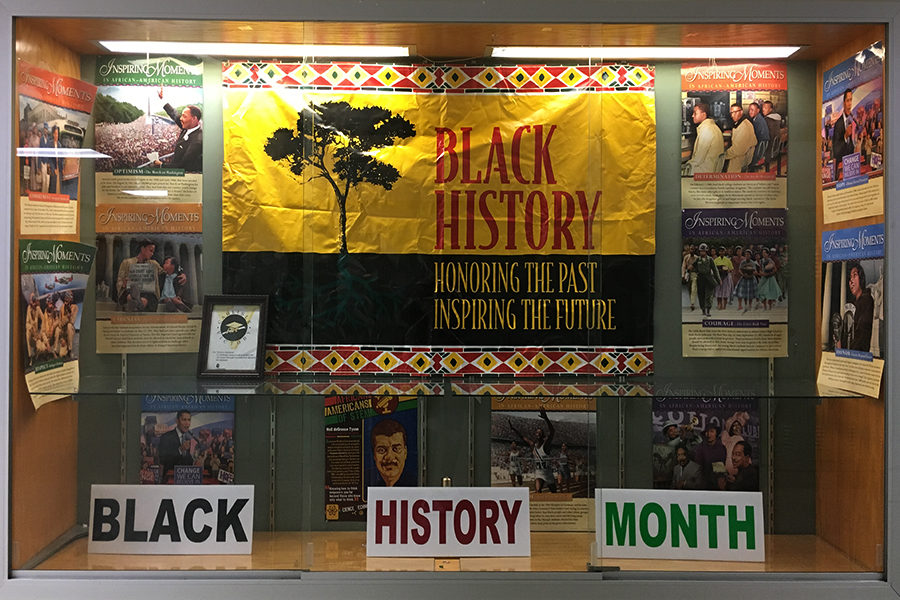Cultural awareness: More attention needs to be given to Black History Month (Editorial)
Black History Month is honored in this Swartz display to showcase the rich past of African Americans. While this is a good start, we need to do more to fully embrace the importance of Black History Month.
The month of February is dedicated to the appreciation of black history in order to bring awareness and remembrance to those who helped make our present the way it is currently. It is an important matter that should be focused on during this time of the school year. Currently, this chance at equal attention is being squandered.
The celebration of Black History Month all began in the 1920s during the Harlem Renaissance. The celebration of black history originally took place only during the second week in February and was established by Carter G. Woodson, one of the first scholars to study African American history, in 1926. He founded the Association for the Study of African American Life and History.
“The 1920s saw the rise in interest in African American culture that was represented by the Harlem Renaissance where writers like Langston Hughes, Georgia Douglass Johnson, Claude McKay—wrote about the joys and sorrows of blackness, and musicians like Louie Armstrong, Duke Ellington, and Jimmy Lunceford captured the new rhythms of the cities created in part by the thousands of southern blacks who migrated to urban centers like Chicago,” according to the National Museum of African American History and Culture. “[A]rtists like Aaron Douglass, Richard Barthe, and Lois Jones created images that celebrated blackness and provided more positive images of the African American experience.”
According to the United States Census Bureau, the second week was chosen because it coincides with the birthdays of Fredrick Douglass and Abraham Lincoln. These two figures were chosen to be recognized because of their important roles in black history. Douglass was the father of the civil rights movement and Lincoln issued the Emancipation Proclamation that helped end slavery.
Over time, it seems that the celebration and acknowledgment of these figures have faded. Some people may not even realize the importance of this month.
From my experiences in four different states, most schools don’t even try to draw attention to the subject for their students. There are occasional displays and short videos but no dedicated time for learning. Nationally, there may be scattered and few events but nothing major and memorable. The representation is slim and disheartening.
Muhammad Ali, Maya Angelou, W.E.B Du Bois, Aretha Franklin, Michael Jackson, Martin Luther King Jr., Barack Obama, Oprah Winfrey, and so on are all notable African Americans but the list doesn’t stop there. There is a lot of history coming from these African American figures that should be highlighted in schools. A short mention of the month and a name or two is not enough.
Outside of school, people of all ages can find events that are commemorating black history.
According to Culture Capital, a program of Humanities, the region of DC has displays of theater, dance, music, visual arts, and the spoken word.
The opportunities to attend these events may not be open to all curious adolescents. School is mandatory and takes seven hours out of a student’s day. A small amount of time during school could be spared to share the valuable information with the new, open minds of this generation.
All we can hope for in the duration of the month of February is that people will stop and think about those who have changed the world today. We want to preserve the culture, continue recognition, and begin a racial transformation.
We need to continue what was started in 1926 but improve every year that passes. Schools should work on providing more opportunities to go into depth on black history so students can be more informed.
Disclaimer: Articles designated as “Editorial” represent the views and opinions of the author, not the 2018-2019 Periscope staff, CHS/CASD administration, or the CHS student body.
Want to help the Herd? Please consider supporting the Periscope program. Your donation will support the student journalists of CHS and allow us to purchase equipment, send students to workshops/camps, and cover our annual website hosting costs.

Heidi Heinlein is currently a sophomore at Carlisle High School. This is her second year as a staff member for Periscope. She is a co-editor of the perspectives...





























































































